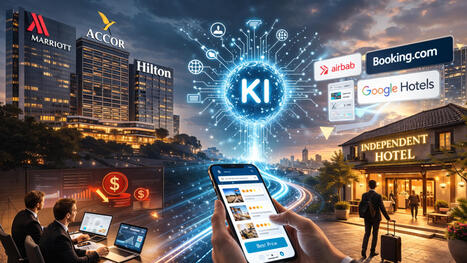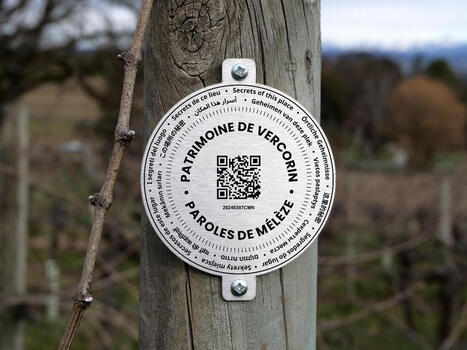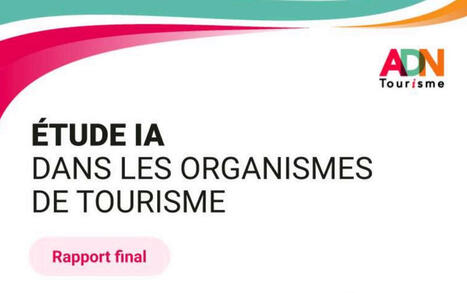 Your new post is loading...
 Your new post is loading...

|
Scooped by
Roland Schegg
Today, 3:36 AM
|
"Die Hotellerie bewegt sich zwischen zwei Welten: Automatisierung und Gastfreundschaft. Dabei entscheidet sich ihre Zukunft nicht im Duell zwischen Mensch und Maschine, sondern dort, wo Intelligenz klug verteilt wird. Davon sind Robert Kneubühler, langjähriger Hotelier und Gründer von Nighty Nighty, sowie die Zukunftsforscherin Dr. Martina Kühne überzeugt. Sie zeigen auf, wie sich Technologie und Menschlichkeit sinnvoll ergänzen lassen.
Gäste buchen heute selbstverständlich per App und nutzen Self-Check-ins. Gleichzeitig wächst die Sehnsucht nach persönlicher Ansprache, nach jemandem, der zuhört und versteht, warum heute ein ruhigeres Zimmer wichtiger ist als gestern. Genau in diesem Spannungsfeld steht die Branche."

|
Scooped by
Roland Schegg
February 26, 10:24 AM
|
Artificial intelligence tools such as ChatGPT are reshaping how travellers begin planning their trips. Research shows that while AI excels at generating fast, personalised suggestions, satisfaction declines when it takes on the role of narrowing choices or making final recommendations. Travelers are more comfortable using AI as a source of inspiration rather than as a decisive authority. The findings highlight the importance of keeping humans actively involved in the final stages of travel decision-making.
Key takeaways
Strong at inspiration: AI performs best when generating an initial pool of destinations, activities, or itineraries that spark ideas and exploration.
Weaker at final selection: Satisfaction and visit intention decrease when AI independently narrows options, as travellers may question what was excluded.

|
Scooped by
Roland Schegg
February 26, 2:27 AM
|
Marriott, Hilton und andere globale Hotelkonzerne warnen in ihren Pflichtmitteilungen vor einem neuen Risiko: Künstliche Intelligenz (KI) könnte Markenloyalität untergraben, Direktbuchungen schwächen und die Vertriebskosten erhöhen. Tatsächlich stehen wir vor einer strukturellen Machtverschiebung im digitalen Vertrieb. Doch wer daraus eine existenzielle Bedrohung ableitet, greift zu kurz. Ja, KI wird den Markt verändern – aber nicht zwangsläufig zu Ungunsten derjenigen, die bereit sind, sich konsequent neu auszurichten.

|
Scooped by
Roland Schegg
February 25, 9:43 AM
|
"Artificial intelligence is rapidly moving to the center of hotel operations and distribution strategies, but industry leaders caution that its impact will depend on how proactively hotels embrace it. Speaking at the Hotel Industry Development Event in London, panelists warned that without urgency, third parties could once again dominate the landscape—much as online travel agencies did during the rise of internet-based distribution. Rather than viewing AI as a threat, experts argued it should function as an “invisible employee” focused on improving efficiency, personalization, and profitability. The consensus: AI will reshape the industry, and hotels must act now to remain in control of their data, distribution, and bottom line."

|
Scooped by
Roland Schegg
February 25, 9:35 AM
|
"Morgan Stanley argues that emerging agentic AI technologies are unlikely to weaken Booking Holdings’ position in the online travel ecosystem. Instead, AI tools may redirect travel discovery toward online travel agency platforms while leaving transactions, customer relationships, and data ownership largely with established OTAs. The analysis suggests that concerns about AI-driven disruption may be overstated, positioning major OTAs to remain central players in travel distribution.
Key takeaways
AI may strengthen OTA traffic: Early agentic AI tools appear more likely to drive users toward OTA platforms for booking rather than replacing them with direct in-AI transactions.
Merchant-of-record advantage: Technology companies such as Google and Meta remain cautious about handling payments and customer service, preserving OTAs’ role as transaction intermediaries."

|
Scooped by
Roland Schegg
February 24, 3:03 PM
|
Travel fraud has evolved into a global $1.3 trillion threat, with cybercriminals increasingly targeting hotel extranets rather than guests directly. AI-powered scams, compromised credentials, and social engineering tactics allow attackers to infiltrate official booking platforms and communicate with real guests through trusted channels. Regulatory changes such as PCI DSS 4.0 are raising compliance requirements while the broader digital environment increases both opportunity and vulnerability. Hotels are now expected to combine technical security measures with organisational awareness to maintain guest trust.

|
Scooped by
Roland Schegg
February 24, 9:30 AM
|
The multiagent platform is purpose-built for hospitality, with plans to expand beyond discovery to the full guest lifecycle.

|
Scooped by
Roland Schegg
February 24, 3:36 AM
|
Airbnb likely sees how flights are driving Booking Holdings' connected-trip vision. The timing is unclear, but it needs flights if it wants to be a true "travel concierge."

|
Scooped by
Roland Schegg
February 24, 1:35 AM
|
Quel est le point commun entre les inscriptions portées par les façades de quelques vieilles maisons du village de Vercorin et des sculptures flottantes prenant vie dans le ciel de Zermatt ? Rien à priori et pourtant ce sont des exemples très réussis de ce que le numérique peut apporter à la valorisation du patrimoine, en particulier dans les montagnes.
Ces deux modèles de bonne pratique viennent d’une étude qui a dressé l’état des lieux de l’intégration des outils numériques dans la préservation et la valorisation des montagnes. Le constat est encourageant : les technologies deviennent des leviers essentiels pour un patrimoine montagnard résilient, bien que des défis de coordination ne puissent être niés.

|
Scooped by
Roland Schegg
February 23, 4:05 AM
|
Expedia’s latest annual filing signals a clear shift in how the company views artificial intelligence. For the first time, generative and agentic AI are explicitly described as competitive risks that could materially reshape how travel is discovered and booked. The company warns that AI-driven assistants may alter consumer behavior, intensify competition, and reduce direct engagement with traditional online travel agencies. At the same time, Expedia is investing in AI capabilities to protect visibility, strengthen operations, and prepare for a more autonomous booking environment.

|
Scooped by
Roland Schegg
February 20, 1:45 AM
|
"Organismes de tourisme : impact de l'IA sur les métiers Date de publication : 16.02.2026 Organisations de Gestion de la Destination (OGD) : Impact de l’IA sur les métiers du tourisme La montée en puissance de l’intelligence artificielle (IA), et notamment de l’IA générative, constitue un enjeu..."

|
Scooped by
Roland Schegg
February 19, 8:42 AM
|
"Booking Holdings reported stronger-than-expected gross bookings growth and raised its revenue outlook, signaling continued resilience in global travel demand. At the same time, the company announced significantly higher reinvestments in artificial intelligence, marketing, and geographic expansion. While overall demand remains solid, Booking also pointed to slightly lower average daily rates and shorter stays, suggesting more cautious consumer spending patterns. For hoteliers, the results highlight both continued opportunity and intensifying platform competition.
Key takeaways
Sustained travel demand: Booking expects gross bookings to grow about 15%, above analyst forecasts, indicating that consumers are still prioritizing travel despite macroeconomic concerns.
Heavy investment in AI and marketing: An additional $700 million in 2026 spending will focus on artificial intelligence, advertising, and geographic expansion—areas that directly influence hotel visibility and conversion on the platform."

|
Scooped by
Roland Schegg
February 19, 2:46 AM
|
In a recent McKinsey interview, Booking Holdings CEO Glenn Fogel positioned the company’s “connected trip” vision as a way to compete in an AI-driven travel landscape, aiming to integrate flights, accommodation, transport, experiences, and payments into one seamless journey. However, current business realities suggest the strategy is still far from maturity, with accommodation bookings continuing to dominate revenue and customer perception. Compared with emerging AI-native travel platforms, fintech ecosystems, and direct supplier innovation, Booking appears to be playing catch-up rather than leading. The connected-trip concept therefore looks more aspirational than operational at this stage, with its ultimate success still uncertain.
Key takeaways
Hotels still drive the business: Accommodation bookings remain the overwhelming revenue foundation, limiting how quickly Booking can reposition itself as a full travel platform.
AI competition accelerating faster: Tech giants, AI assistants, and supplier direct channels are advancing rapidly, potentially outpacing Booking’s platform transformation.
Connected trip still early-stage: Integrated, multi-component travel bookings represent only a relatively small share of overall transactions today.
|

|
Scooped by
Roland Schegg
February 27, 2:51 AM
|
OTAs reported double-digit gross bookings growth in the latest earnings cycle even as consumer travel spending declined. Credit-card data shows little correlation between overall travel spending and OTA performance over the past three years, confirming that OTA growth is increasingly decoupled from underlying demand trends. Instead of signaling a market-wide recovery, recent results point to share gains, B2B expansion, marketing efficiency, and monetization mechanics. The industry may need a new framework to interpret OTA results more accurately.
Key takeaways
Decorrelation confirmed: Credit-card data shows near-zero correlation between consumer travel spending and OTA gross bookings, indicating that OTA performance is no longer a reliable proxy for demand.
Strong growth despite soft spending: Booking Holdings, Airbnb, and Expedia posted double-digit or high single-digit gross bookings growth while overall travel spending declined year over year.

|
Scooped by
Roland Schegg
February 26, 4:45 AM
|
Google n’est pas mort. Le volume de recherches continue de progresser et les revenus Search continuent d’accélérer (+17% au Q4 2025). Le search est en expansion, pas en déclin.
L’IA ne remplace pas le search, elle s’y ajoute. L’usage de l’IA dans la préparation de voyages reste marginal (8-11% d’usage régulier en France). 99,8% des utilisateurs de ChatGPT utilisent aussi Google.
Le vrai danger, ce ne sont pas les chatbots mais les AI Overviews. Ces synthèses IA que Google affiche en haut de ses résultats, avec des baisses de clics de plus de 60% là où elles sont déployées.
En France, on ne les voit pas encore. Un contentieux sur les droits voisins bloque leur déploiement. On vit dans une bulle qui fausse notre perception, et nos diagnostics.
Le compteur change. On passe d’un clic à gagner à une citation à mériter. Et la bonne nouvelle, c’est que les fondamentaux SEO préparent déjà à ce monde-là.

|
Scooped by
Roland Schegg
February 26, 2:15 AM
|
Marriott, die grösste Hotelgruppe der Welt, investiert massiv in künstliche Intelligenz und digitale Kernsysteme. Mit einem milliardenschweren Modernisierungsprogramm will der Hotelkonzern Reservierungssysteme, Property-Management-Plattformen und Loyalitätsprogramme neu aufstellen. KI soll Effizienz steigern, Gästeerlebnisse personalisieren und die Wettbewerbsdynamik im Vertrieb neu ordnen.

|
Scooped by
Roland Schegg
February 25, 9:41 AM
|
AI is rapidly transforming travel fraud, making scams more sophisticated and harder to detect for travelers and travel providers alike. Advanced language models, deepfake technology, and AI-generated websites allow criminals to impersonate legitimate travel brands convincingly. Experts warn that traditional warning signs are fading, increasing financial risks and trust challenges across the travel ecosystem. At the same time, travel companies are deploying counter-technologies, creating an ongoing technological arms race.

|
Scooped by
Roland Schegg
February 25, 9:32 AM
|
Xavier Amatriain, Expedia Group's recently appointed chief artificial intelligence (AI) and data officer, announced on LinkedIn that he is hiring two “Distinguished Scientists” to help lead agentic AI strategy.
“We aren't just shipping wrappers; we are reimagining how travel works using the next generation of AI orchestration and reasoning,” Amatriain wrote.
As travel businesses rethink distribution and prioritize agentic capabilities, AI literacy is rapidly becoming a job requirement. This shift is prompting changes in the C-suite and beyond, with travel giants posting AI-related roles and expanding their engineering teams.

|
Scooped by
Roland Schegg
February 24, 3:02 PM
|
Hotel marketing is becoming increasingly complex as AI-generated content proliferates and travelers move fluidly across digital platforms. Expedia Group Advertising’s “Science of Wanderlust” research, based on consumer surveys and behavioral analysis, explores which content elements most effectively influence travel decisions. The findings indicate that while AI can enhance marketing efficiency, authentic storytelling, emotional connection and relevance remain decisive for building trust and driving bookings. Hotels that balance technology with human creativity are better positioned to capture attention and convert interest into reservations.

|
Scooped by
Roland Schegg
February 24, 3:38 AM
|
Mit Openclaw und ähnlichen Systemen beginnt eine neue Phase der künstlichen Intelligenz: Agenten, die nicht mehr nur antworten, sondern eigenständig handeln. Der Beitrag beschreibt, warum dieser "Clawdbot-Moment" mehr ist als ein technisches Experiment – und dass insbesondere der Tourismus früh betroffen sein wird.
Neue Stufe in der KI-Entwicklung
Die künstliche Intelligenz entwickelt sich rasant und hat jetzt die dritte Stufe erreicht, die wieder einmal den Tourismus als eines der ersten Anwendungsfelder treffen wird.
Aus meiner Sicht gab es drei große KI-Momente, die jeweils einen tiefgreifenden Wandel markierten und zumindest medial breite Aufmerksamkeit fanden – auch wenn nicht jeder die technischen Details verstand. Es waren jene Momente, die es in die ZIB2 schafften oder als Schlagzeile in der BILD-Zeitung auftauchten.

|
Scooped by
Roland Schegg
February 24, 1:35 AM
|
Was haben die Inschriften an den Fassaden einiger alter Häuser im Dorf Vercorin mit schwebenden Skulpturen gemeinsam, die am Himmel über Zermatt lebendig werden? Auf den ersten Blick nichts – und doch sind es sehr gelungene Beispiele dafür, was die Digitalisierung zur Aufwertung des Kulturerbes beitragen kann, insbesondere in den Bergen.
Diese beiden Best-Practice-Modelle stammen aus einer Studie, die den Stand der Integration digitaler Werkzeuge in die Bereiche Schutz und Aufwertung von Berggebieten untersucht hat. Das Fazit ist ermutigend: Technologien werden zu entscheidenden Hebeln für ein resilienteres Bergkulturerbe, auch wenn Herausforderungen bei der Koordination bestehen bleiben.

|
Scooped by
Roland Schegg
February 24, 12:35 AM
|
"For Booking Holdings CEO Glenn Fogel, the future of travel is the “connected trip.” Everything is seamless, everything is easy, and everything updates automatically if conditions change—when, say, a flight is delayed or inclement weather postpones a city walking tour. Fogel believes AI holds the key to fully realizing this vision. Booking Holdings provides online travel services in more than 220 countries. Its 2024 gross travel bookings were $166 billion (up 10 percent year over year), and its adjusted earnings totaled more than $8 billion (up 17 percent from the previous year). The company’s brands include Kayak, OpenTable, and Booking.com, one of the world’s leading accommodations websites. Fogel joined the parent company in 2000 and became its CEO and president in 2017. He is also CEO of Booking.com."

|
Scooped by
Roland Schegg
February 20, 1:46 AM
|
Une mutation profonde de la gestion de la donnée
L’enquête de terrain, menée tout au long du second semestre 2025, permet de battre en brèche une idée reçue : l’IA générative ne remplace pas les métiers, mais les transforme et déplace leur valeur ajoutée d’un rôle de la production vers la vérification et la contextualisation. Si l’outil accélère la rédaction, la synthèse ou la traduction, il exige en retour une expertise humaine renforcée pour garantir la fiabilité de l’information.
Face à la prolifération des contenus, parfois approximatifs ou faux, générés par les algorithmes, les organismes institutionnels de tourisme doivent se positionner désormais en garants de la véracité, de la fiabilité et de la cohérence des informations diffusées

|
Scooped by
Roland Schegg
February 19, 8:44 AM
|
"Booking Holdings CEO Glenn Fogel underscored the critical role of independent hotels in the company’s business model as new competitive pressures emerge from AI booking platforms and Airbnb. Independent properties continue to generate the majority of room nights on Booking.com, reinforcing their importance to the platform’s global inventory. At the same time, technological shifts and alternative distribution channels are reshaping how these hotels may reach travelers. Booking is responding with increased AI investment, expanded travel offerings, and continued partner support initiatives.
Key takeaways
Independent hotels drive booking’s inventory strength: Smaller properties provide most room nights on the platform, making them central to Booking’s long-term growth strategy.
AI platforms introduce new distribution dynamics: Emerging AI travel agents could automate hotel search and booking, potentially influencing how independent hotels gain visibility."

|
Scooped by
Roland Schegg
February 19, 2:50 AM
|
Artificial intelligence is rapidly becoming a key travel discovery and booking interface, reshaping how guests choose hotels. Hotels with unclear, incomplete, or inconsistent data risk losing direct bookings because AI agents tend to favor sources with structured, reliable information. As AI platforms increasingly guide traveler decisions, data quality is emerging as a decisive factor in distribution control. Hotels that fail to adapt may see growing dependence on OTAs and other intermediaries.
Key takeaways
AI favors structured, reliable data: Hotels providing clear structured information are more likely to appear in AI recommendations than those relying on unstructured marketing content.
Direct booking risk is increasing: When hotel data is incomplete or inconsistent, AI agents may default to OTAs or large platforms with cleaner, standardized data.
|
 Your new post is loading...
Your new post is loading...
 Your new post is loading...
Your new post is loading...






















